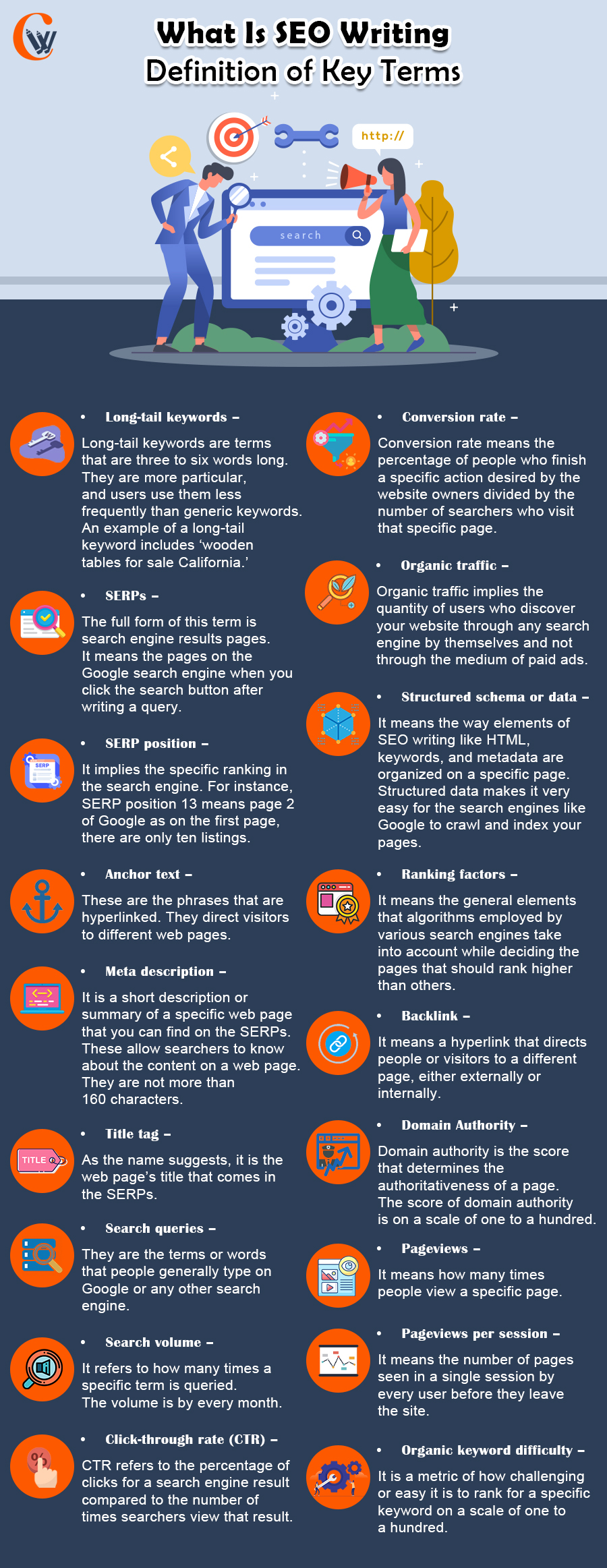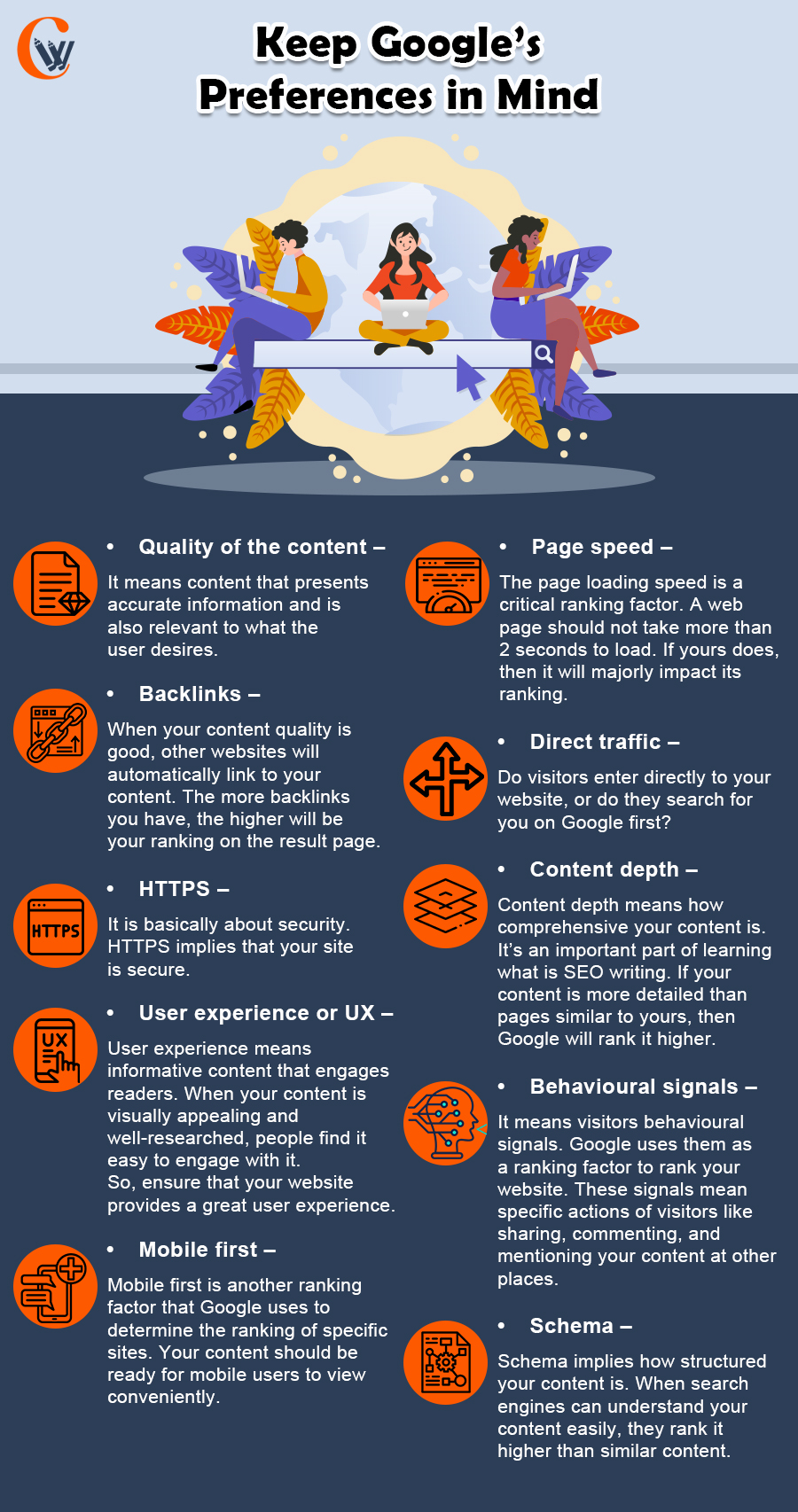Search engine optimization or SEO is a rapidly growing industry that’s currently worth $80 billion. SEO is the process that ensures your site and all its contents are easily understandable and discoverable through search engines like Bing and Google. This type of writing needs a person to possess analytics proficiency and strong copy skills. These facts might make you wonder what is SEO writing and why it’s becoming so important with every passing year. Well, it’s the implementation of keywords and key phrases in your website content. SEO-optimized content enhances the organic visibility and search engine rankings of a website. This post will outline all the ways by which you can produce effective SEO-optimized content and please both your visitors and search engines.
What Is SEO Writing – Definition of Key Terms
The answer to the question of what is SEO writing begins with an understanding of key terms associated with it. These are given below for you to read.
- Long-tail keywords – Long-tail keywords are terms that are three to six words long. They are more particular, and users use them less frequently than generic keywords. An example of a long-tail keyword includes ‘wooden tables for sale California.’
- SERPs – The full form of this term is search engine results pages. It means the pages on the Google search engine when you click the search button after writing a query.
- SERP position – It implies the specific ranking in the search engine. For instance, SERP position 13 means page 2 of Google as on the first page, there are only ten listings.
- Anchor text – These are the phrases that are hyperlinked. They direct visitors to different web pages.
- Meta description – It is a short description or summary of a specific web page that you can find on the SERPs. These allow searchers to know about the content on a web page. They are not more than 160 characters.
- Title tag – As the name suggests, it is the web page’s title that comes in the SERPs.
- Search queries – They are the terms or words that people generally type on Google or any other search engine.
- Search volume – It refers to how many times a specific term is queried. The volume is by every month.
- Click-through rate (CTR) – CTR refers to the percentage of clicks for a search engine result compared to the number of times searchers view that result.
- Conversion rate – Conversion rate means the percentage of people who finish a specific action desired by the website owners divided by the number of searchers who visit that specific page.
- Organic traffic – Organic traffic implies the quantity of users who discover your website through any search engine by themselves and not through the medium of paid ads.
- Structured schema or data – It means the way elements of SEO writing like HTML, keywords, and metadata are organized on a specific page. Structured data makes it very easy for the search engines like Google to crawl and index your pages.
- Ranking factors – It means the general elements that algorithms employed by various search engines take into account while deciding the pages that should rank higher than others.
- Backlink – It means a hyperlink that directs people or visitors to a different page, either externally or internally.
- Domain Authority – Domain authority is the score that determines the authoritativeness of a page. The score of domain authority is on a scale of one to a hundred.
- Pageviews – It means how many times people view a specific page.
- Pageviews per session – It means the number of pages seen in a single session by every user before they leave the site.
- Organic keyword difficulty – It is a metric of how challenging or easy it is to rank for a specific keyword on a scale of one to a hundred.

How to Begin the Process of SEO Writing?
By now, you must be reasonably familiar with what is SEO content writing. For creating good SEO-optimized content, there are many things that you need to take into account. Let’s break them down one by one.
Begin with your goals in mind
The basis of an effective SEO content strategy is to know exactly what you want to accomplish. For that, it’s important to set measurable and tangible goals for yourself. You want everyone from marketing managers to copywriters to work toward attaining the same KPIs. Some important metrics to monitor include
- Conversion rate
- Click-through rate
- Backlinks
- Organic traffic
- SERP position
- Domain and page authority
- Dwell time
- Pageviews per session
- Organic keyword difficulty/opportunity
Everyone who is writing for SEO must get the information they require to accomplish the optimization goals. You should ensure that every single page of your website is linked and serves your primary business goal.
Pay attention to your search engine results page (SERP) presentation.
There are numerous methods through which search giants like Google and Bing display your web pages to visitors. These are called featured snippets. In simple words, it means that not every single content of yours gets showcased to the visitors in an identical manner.
For example, if two organizations create content on a single topic, and one of those pages ranks high in the SERPs, it may get a featured snippet. The content of the organization that ranks highly in the search engine results will be showcased with bolded texts, extra images, among other things. On the other hand, the organization’s content that didn’t score highly on the SERPs will get showcased as an average blue link.
To make a mark on the search engine, you need first to understand how your content will appear on the search engine pages. After that, you need to optimize for that particular format. Some things to pay attention to are:
- List
- Paragraph
- Image carousel
- Knowledge graph
- Local 3-pack
- Top stories
- People also ask
- Site links
Keep Google’s preferences in mind.
When you want to know how to write SEO content that fetches you conversions and increases your sales, keep Google’s preferences in your mind. RankBrain is the major algorithm of Google. It processes the different web pages and finds their position on the search engine results pages.
When you desire to know what is SEO writing example, keep in mind that SEO friendly content is more than just pleasing the readers. It’s also about pleasing the search engines. Thus, it’s crucial for you to learn particular ranking factors that play a role in enabling your page to rank high. At present, there are beyond 200 ranking factors that decide the fate of specific content. However, you don’t need to be worried about all 200. Ensure that you are well familiar with ten of the most critical ones. These ten ranking factors include the following:
- Quality of the content – It means content that presents accurate information and is also relevant to what the user desires.
- Backlinks – When your content quality is good, other websites will automatically link to your content. The more backlinks you have, the higher will be your ranking on the result page.
- HTTPS – It is basically about security. HTTPS implies that your site is secure.
- User experience or UX – User experience means informative content that engages readers. When your content is visually appealing and well-researched, people find it easy to engage with it. So, ensure that your website provides a great user experience.
- Mobile first – Mobile first is another ranking factor that Google uses to determine the ranking of specific sites. Your content should be ready for mobile users to view conveniently.
- Page speed – The page loading speed is a critical ranking factor. A web page should not take more than 2 seconds to load. If yours does, then it will majorly impact its ranking.
- Direct traffic – Do visitors enter directly to your website, or do they search for you on Google first?
- Content depth – Content depth means how comprehensive your content is. It’s an important part of learning what is SEO writing. If your content is more detailed than pages similar to yours, then Google will rank it higher.
- Behavioural signals – It means visitors behavioural signals. Google uses them as a ranking factor to rank your website. These signals mean specific actions of visitors like sharing, commenting and mentioning your content at other places.
- Schema – Schema implies how structured your content is. When search engines can understand your content easily, they rank it higher than similar content.

Use keywords strategically
SEO is an ever-evolving domain. Previously, the content was ranked according to the number of times it repeated a particular keyword. This refers to keyword density. But the situation has completely changed in recent years. Google’s algorithm now knows the difference between content that has keyword stuffed in it and the one with keywords at strategic places on it.
The strategic placement of keywords is an integral part of writing for SEO. It means that every page should revolve around one keyword. The professionals of content writing services cover every aspect of a particular topic and subtopics. Ask yourself what queries might a reader have after reading your piece. Then, provide answers to those queries in your content.
The idea is to become a good resource of information on your particular topic. It will enable you to give your readers valuable information. When you write informative articles, then you don’t need to worry about keyword stuffing. They naturally flow in your writing, making it optimized for the search engine.
What is SEO Writing – Effective SEO Copy Techniques You Should Know
When you are writing is defined by the following characteristics, it will naturally become fully optimized for the search engine. Here are some of the best ad actionable copy tips that every SEO content writer should implement.
- Never write solely for yourself. Instead, keep your target audience in your mind.
- Ensure that your content is in a conversational tone. It should reflect the voice of your target readers.
- SEO content writing services experts always make use of keywords in metadata, page title, header tags, and anchor tags.
- Write in short paragraphs and sentences.
- Leave whitespace for better readability of your content.
- Link to reputable sites that have a great domain authority score.
- Place internal links to posts that are related to the topic that the reader is reading.
- Make your content informative. Use large amounts of data, so your claims remain well supported.
- Embed visuals and imagery to make the narrative exciting.
- Cover a specific topic comprehensively. Do not write short content.
- Write keeping in mind the featured snippets of Google.
One of the most essential components of what is SEO writing is understanding metadata. Metadata gives a cue to search engines. It gives them information about your content and the manner in which it should get displayed in the search engine results pages. When it comes to writing metadata, keep the following things in mind.
- Title tag optimization – Use only a single header tag on one page and include in it a primary keyword. Make sure to keep it till or less than 70 characters. Every page should include an original title tag.
- Meta descriptions optimization – Keep them 160 characters in length. So, Google does not cut them. Write attractive meta descriptions.
- Alt text optimization – Make use of descriptive language that aligns with the image. Include keywords where they are appropriate. Keep it under 125 characters and separate the tags by commas.
Make use of headers and subheaders.
Header or HTML tags are the bones of your content. When you desire to know what is SEO content writing, it means content that has good usage of heading tags. It’s because headers make your copy organized, and readers get a general overview of what you are trying to communicate.
Headers signal the search engine the context of your article. Proper usage of these tags allows the crawlers to assess your page and index it in the search results. Here is the meaning of different heading tags:
- H1 – The major title of your content page.
- H2 – These outline core topics in your content.
- H3 – They are used for sub-topics that align with H2s.
- H4 – They are not much used, but you can use them when you describe something with a lot of detailed information.
Continuously optimize your pages for the search engine.
A major aspect of how to write SEO is using keywords in a manner that help you increase your visibility on the search engine. When you are creating content on a particular topic, another one in your domain might be creating content on the same topic. It is also possible that their content is better than yours.
That’s why it is important to search for ways to optimize your content continuously. For example, if your content is at position three on Google, how can you put it on position 1.
A great way to get more traffic and enhance your website’s ranking is, to begin with, an already existing content piece that is performing fairly well. Make minor modifications to it, like restructuring header tags or adding a couple of paragraphs of more information.
When you optimize your content in this manner, not only will you save time but also get better rewards from the search engine. For the best results, make a re-optimization schedule, for instance, every four to eight months. Adjust your pages as per your needs to increase your search engine rankings.
Skills of a Great SEO Content Writer
Now that you know everything about what is SEO writing, it is time to know precisely the skills that you would want in you to excel as an SEO writer. To be great at this work, you must have certain essential skills in your arsenal. These skills and qualities include the following:
- You should be able to write content that has minimal grammatical errors. It must be concise and clear.
- It would be best to always focus on the reader’s point of view and not your own.
- Implement keywords organically so that they look natural.
- You should have the ability to undertake research on those topics that you don’t know much about.
- You should be able to write in a proper tone. The content you create should be engaging so that the reader can connect with your services.
- You should be able to manage time well and meet different content deadlines.
Wrapping up
SEO content writing is more than just good writing. For making your content rich in quality in order to rank well, it should be engaging, well-organized, and readable. Ensure that whatever you write is organized using various headings so it becomes more scannable. Never make the mistake of stuffing keywords. Instead, use them in context and organically. Research well and link your content to websites that have high domain authority scores. Last but not least, continue working on optimizing the content.
Related Post: Importance of SEO Writing
